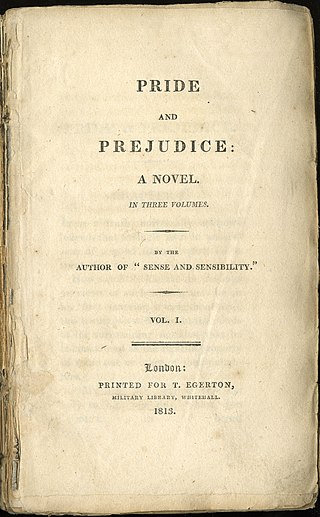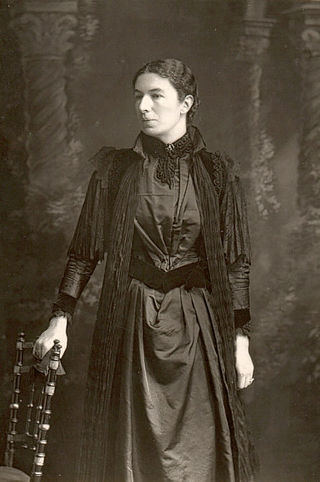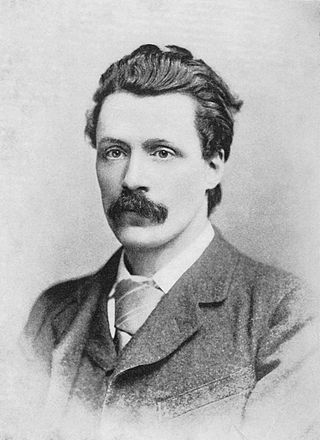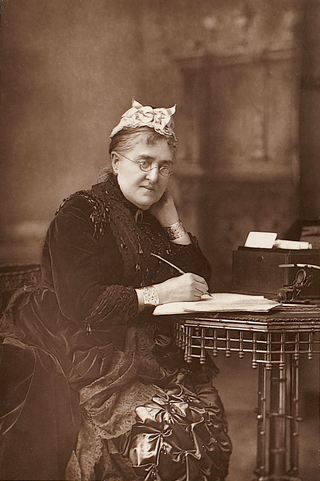
Pride and Prejudice is an 1813 novel of manners by English author Jane Austen. The novel follows the character development of Elizabeth Bennet, the protagonist of the book, who learns about the repercussions of hasty judgments and comes to appreciate the difference between superficial goodness and actual goodness.

Elizabeth Cleghorn Gaskell, often referred to as Mrs Gaskell, was an English novelist, biographer, and short story writer. Her novels offer a detailed portrait of the lives of many strata of Victorian society, including the very poor. Her first novel, Mary Barton, was published in 1848. Gaskell's The Life of Charlotte Brontë, published in 1857, was the first biography of Charlotte Brontë. In this biography, she wrote only of the moral, sophisticated things in Brontë's life; the rest she omitted, deciding certain, more salacious aspects were better kept hidden. Among Gaskell's best known novels are Cranford (1851–1853), North and South (1854–1855), and Wives and Daughters (1864–1866), all of which were adapted for television by the BBC.

The English novel is an important part of English literature. This article mainly concerns novels, written in English, by novelists who were born or have spent a significant part of their lives in England, Scotland, Wales, or Northern Ireland. However, given the nature of the subject, this guideline has been applied with common sense, and reference is made to novels in other languages or novelists who are not primarily British, where appropriate.

Mary Augusta Ward was a British novelist who wrote under her married name as Mrs Humphry Ward. She worked to improve education for the poor setting up a Settlement in London and in 1908 she became the founding President of the Women's National Anti-Suffrage League.

George Meredith was an English novelist and poet of the Victorian era. At first his focus was poetry, influenced by John Keats among others, but he gradually established a reputation as a novelist. The Ordeal of Richard Feverel (1859) briefly scandalised Victorian literary circles. Of his later novels, the most enduring is The Egoist (1879), though in his lifetime his greatest success was Diana of the Crossways (1885). His novels were innovative in their attention to characters' psychology, and also took a close interest in social change. His style, in both poetry and prose, was noted for its syntactic complexity; Oscar Wilde likened it to "chaos illumined by brilliant flashes of lightning". He was an encourager of other novelists, as well as an influence on them; among those to benefit were Robert Louis Stevenson and George Gissing. He was nominated for the Nobel Prize in Literature seven times.

George Robert Gissing was an English novelist, who published 23 novels between 1880 and 1903. His best-known works have reappeared in modern editions. They include The Nether World (1889), New Grub Street (1891) and The Odd Women (1893).

Henry Kingsley was an English novelist, brother of the better-known Charles Kingsley. He was an early exponent of muscular Christianity in an 1859 work, The Recollections of Geoffry Hamlyn.

The Hand of Ethelberta: A Comedy in Chapters is a novel by Thomas Hardy, published in 1876. It was written, in serial form, for The Cornhill Magazine, which was edited by Leslie Stephen, a friend and mentor of Hardy's. Unlike the majority of Hardy's fiction, the novel is a comedy, with both humour and a happy ending for the major characters and no suicides or tragic deaths. The late nineteenth century novelist George Gissing, who knew Hardy, considered it "surely old Hardy's poorest book".

Margaret Oliphant Wilson Oliphant was a Scottish novelist and historical writer, who usually wrote as Mrs. Oliphant. Her fictional works cover "domestic realism, the historical novel and tales of the supernatural".

Eliza Lynn Linton was the first female salaried journalist in Britain and the author of over 20 novels. Despite her path-breaking role as an independent woman, many of her essays took a strong anti-feminist slant.

Lucas Malet was the pseudonym of Mary St Leger Kingsley, a Victorian novelist. Of her novels, The Wages of Sin (1891) and The History of Sir Richard Calmady (1901) were especially popular. Malet scholar Talia Schaffer notes that she was "widely regarded as one of the premier writers of fiction in the English-speaking world" at the height of her career, but her reputation declined by the end of her life and today she is rarely read or studied. At the height of her popularity she was "compared favorably to Thomas Hardy, and Henry James, with sales rivaling Rudyard Kipling." Malet's fin de siecle novels offer "detailed, sensitive investigations of the psychology of masochism, perverse desires, unconventional gender roles, and the body."

North and South is a social novel published in 1854–55 by English author Elizabeth Gaskell. With Wives and Daughters (1865) and Cranford (1853), it is one of her best-known novels and was adapted for television three times. At first, Gaskell wanted the novel to be titled after the heroine, Margaret Hale, but Charles Dickens, the editor of Household Words, the magazine in which the novel was serialised, insisted on North and South.

Esther Waters is a novel by George Moore first published in 1894.

Phoebe, Junior: A Last Chronicle of Carlingford is an 1876 novel by Margaret Oliphant. It follows the exploits of its heroine, Phoebe Beecham, as she learns the true history of her family history. This novel is the last of the six Carlingford Chronicles, and is set roughly in the early 1860s to late 1870s. The theme is social status and snobbery, when earlier conventions were challenged by changes in religion and politics in Victorian society. Phoebe Junior was dramatised by BBC Radio Four in 1993.
Christian Isobel Johnstone (1781–1857) was a prolific journalist and author in Scotland in the nineteenth century. She was a significant early feminist and an advocate of other liberal causes in her era. She wrote anonymously, and under the pseudonym Margaret Dods. She is highlighted as one of the first paid female editors of a journal.

New Amazonia: A Foretaste of the Future is a feminist utopian novel, written by Elizabeth Burgoyne Corbett and first published in 1889. It was one element in the wave of utopian and dystopian literature that marked the later nineteenth and early twentieth centuries.

Annie Shepherd Swan, CBE was a Scottish journalist and fiction writer. She wrote mainly in her maiden name, but also as David Lyall and later Mrs Burnett Smith. A writer of romantic fiction for women, she had over 200 novels, serials, stories and other fiction published between 1878 and her death. She has been called "one of the most commercially successful popular novelists of the later nineteenth and early twentieth centuries". Swan was politically active in the First World War, and as a suffragist, a Liberal activist and founder-member and vice-president of the Scottish National Party.
Anna (Annie) Louisa Walker was an English and Canadian teacher and author. She wrote five novels and two collections of poetry and edited an autobiography. Her poem "The Night Cometh" provides the text of the popular hymn "Work, for the night is coming".

The Odd Women is an 1893 novel by the English novelist George Gissing. Its themes are the role of women in society, marriage, morals and the early feminist movement.

In the Year of Jubilee is the thirteenth novel by English author George Gissing. First published in 1894.

















